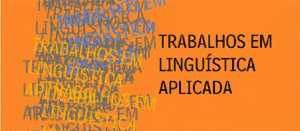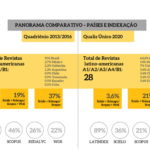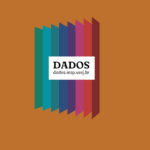Paula Tatianne Carréra Szundy, Universidade Federal do Rio de Janeiro, Rio de Janeiro, Brazil.
Maria Lúcia Castanheira, Universidade Federal de Minas Gerais, Belo Horizonte, Brazil.
Judith Green, Universidade da Califórnia, Santa Barbara, Califórnia, United States of America.
 The article “Researching practices in literacies across languages and social domains: International Perspectives”, published by Papers in Applied Linguistics, is the introductory paper of a thematic issue that brings together studies on literacy processes and practices developed in and through various languages (e.g., Chinese, English, Portuguese, Spanish, among others) and social actions undertaken by particular configuration of actors in different social spaces (e.g., rural communities, higher education classes, teacher education processes, academic writing collaborations, and K-12 classrooms etc.). The article draws considerations on studies whose research perspectives add new insights into ways of studying the multi-faceted, dynamic, complex, and discursive nature of literacy processes, practices and texts in particular social, cultural, linguistic, and political spaces. Given its focus on the complex and consequential nature of language-literacy relationships in particular social settings, it provides a rich and conceptually grounded space for (re)thinking what constitutes literacy studies in the scope of Applied Linguistics.
The article “Researching practices in literacies across languages and social domains: International Perspectives”, published by Papers in Applied Linguistics, is the introductory paper of a thematic issue that brings together studies on literacy processes and practices developed in and through various languages (e.g., Chinese, English, Portuguese, Spanish, among others) and social actions undertaken by particular configuration of actors in different social spaces (e.g., rural communities, higher education classes, teacher education processes, academic writing collaborations, and K-12 classrooms etc.). The article draws considerations on studies whose research perspectives add new insights into ways of studying the multi-faceted, dynamic, complex, and discursive nature of literacy processes, practices and texts in particular social, cultural, linguistic, and political spaces. Given its focus on the complex and consequential nature of language-literacy relationships in particular social settings, it provides a rich and conceptually grounded space for (re)thinking what constitutes literacy studies in the scope of Applied Linguistics.
The idea for the special issue reviewed in the article resulted from the participation of the authors in the Research Network (ReN) “Literacies Across Languages and Social Domains”, which integrates the International Association of Applied Linguistics (AILA). Based on the meaningful dialogues that applied linguists across the world have been establishing with concepts in the field of literacy studies, the ReN aims at bringing together international scholars to develop a comprehensive view concerning the ways of studying literacy practices and processes in the scope of Applied Linguistics. As the article specifies, scholars who are part of this ReN draw on and explore different perspectives on language and literacy relationships in multiple social spaces and/or institutions, including New Literacy Studies, multiliteracies, digital literacies, academic literacies, interactional ethnography, among others.
This multiplicity of perspectives results from fruitful dialogues that have been established within and across fields of study: Linguistics, Sociolinguistics, Discourse Analysis, Literature, Education, Cultural Studies, Sociocultural Theory, Conversation Analysis, Race and Gender studies, Anthropology, among others. By blurring the borders between disciplines/areas and opposing universal, functional and instrumental approaches to language studies, this introductory article for the thematic issue established fruitful dialogues with a transgressive view of Applied Linguistics (MOITA LOPES, 2006, PENNYCOOK, 2006, SZUNDY; FABRÍCIO, 2019), which rejects interpretations that essentialize language, identity and contexts. Such a transgressive view of Applied Linguistics is closely connected to the ideological model of literacies proposed by Street (1984, 2009, 2014). From both perspectives, there is no escape from ideology and, therefore, no possibility of assuming neutral perspectives towards situated language uses. Literacy practices, as Street reminds us, are always imbued of/by power relations, making it fundamental to comprehend how participants (de/re)construct meanings during and about literacy practices in which they engage from a socio-cultural perspective.
The 13 articles, written in English or Spanish, and review of the book Las pedagogías de la comunidad a través de investigaciones locales en el contexto urbano de Bogotá (Olarte; Galindo, 2019), which are briefly introduced in the paper, both share an ideological perspective toward literacy and rely on multiple epistemological lenses to raise issues about meaning constructions and circulation processes of literacy practices in different social domains. These domains include educational, scientific, health, rural and digital spaces in Brazil, Taiwan, the United States, Mexico, and England.
A primary focus of the studies reviewed in this introductory article is on literacy practices and processes in different educational settings, which include: literacy encounters with a first grader (HARRIS, 2020); the dialogic processes between a fourth grade teacher and the researcher (GUPTA, 2020); the production of transmedia pedagogical materials to teach Spanish (TILIO; LOBO, 2020); gender and racial identities in a Literature class (POWER-CARTER, 2020); (multi)literacy practices in which the teacher and students engage in while decolonizing English Language Teaching (MULICO, 2020); the production of visual narratives about rural communities using short digital videos (MACHADO ET AL, 2020); literacy practices and processes through which social actors (de/re)construct knowledge in academic settings (CHIAN, 2020; SZUNDY, 2020, DIAS, 2020; OLMOS-LÓPEZ; TUSTING, 2020).
Three other papers described take the readers to a journey into literacy practices in other social contexts: a community citizen-science program in Mexico (MENDEZ; KALMAN, 2020); interactions between health professionals and patients in the processes of interpreting fetal ultrassound images in Brazil (Ostermann, Frezza; Perobelli, 2020); literacy practices in which fan fiction readers and writers engage on-line (MARTINS, 2020).
The dialogues with heterogeneous research practices in literacies across languages and social domains presented by the studies reviewed in this introductory article can enhance understandings of, and shed light on, the emerging set of epistemological approaches to literacy practices that have been developing at the intersection of literacy studies and Applied Linguistics.
References
CLAVIJO OLARTE, A and RAMÍREZ GALINDO, L. M. Las pedagogías de la comunidade a través de investigaciones locales en el contexto urbano de Bogotá. Bogotá: Editorial Universidad Distrital Francisco José de Caldas, 2019.
MOITA LOPES, L. P. Linguística Aplicada e vida contemporânea: problematização dos construtos que têm orientado a pesquisa. In MOITA LOPES, L. P. (ed.) Por uma Linguística aplicada indisciplinar. São Paulo: Parábola, 2006.
PENNYCOOK, A. Uma Linguística Aplicada transgressiva. In MOITA LOPES, L. P. (ed.) Por uma Linguística aplicada indisciplinar. São Paulo: Parábola, 2006.
STREET, B. V. Literacy in theory and practice. Cambridge: UK/Cambridge University Press, 1984.
STREET, B. Ethnography of writing and reading. In: TORRANCE, N. and OLSON, D. R. (eds.) The Cambridge handbook of literacy. Cambridge University Press, 2009.
STREET, B. Letramentos sociais: abordagens críticas do letramento no desenvolvimento, na etnografia e na educação. Trad. de Marcos Bagno. São Paulo: Parábola Editorial, 2014.
SZUNDY, P. T. C. and FABRÍCIO, B. F. Linguística Aplicada e indisciplinaridade no Brasil: promovendo diálogos, dissipando brumas e projetando desafios. In: SZUNDY, P. T. C.; TILIO, R. and MELO, G. C. V. (ed.) Inovações e desafios epistemológicos em Linguística Aplicada: perspectivas sul-americanas. Campinas: Pontes Editores, 2019.
To read the article, acess
SZUNDY, P. T. C., CASTANHEIRA, M. L. and GREEN, J. RESEARCHING PRACTICES IN LITERACIES ACROSS LANGUAGES AND SOCIAL DOMAINS: INTERNATIONAL PERSPECTIVES. Trabalhos em Linguística Aplicada [online]. 2020, vol. 59, no. 1, pp. 1-9 [viewed 14 May 2021]. https://doi.org/10.1590/01031813681631220200401. Available from: http://ref.scielo.org/4jgdwy
To read the thematic issue, acess
External links
Trabalhos em Linguística Aplicada – TLA: www.scielo.br/tla
Como citar este post [ISO 690/2010]:



















Recent Comments